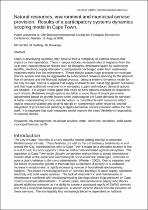 ResearchSpace
ResearchSpace
Natural resources, environment and municipal service provision: Results of a participatory systems dynamics scoping model in Cape Town
JavaScript is disabled for your browser. Some features of this site may not work without it.
- ResearchSpace
- →
- Research Publications/Outputs
- →
- Conference Publications
- →
- View Item
| dc.contributor.author |
De Wit, MP

|
|
| dc.contributor.author |
Swilling, M

|
|
| dc.contributor.author |
Musango, JK

|
|
| dc.date.accessioned | 2009-03-17T14:52:31Z | |
| dc.date.available | 2009-03-17T14:52:31Z | |
| dc.date.issued | 2008-08-11 | |
| dc.identifier.citation | De Wit, MP, Swilling, M and Musango, JK. 2008. Natural resources, environment and municipal service provision: results of a participatory systems dynamics scoping model in Cape Town. 10th Biennial International Society for Ecological Economics Conference, Nairobi, Kenya, 11 August 2008, pp 74 | en |
| dc.identifier.uri | http://hdl.handle.net/10204/3223 | |
| dc.description | 10th Biennial International Society for Ecological Economics Conference, Nairobi, Kenya, 11 August 2008 | en |
| dc.description.abstract | Cities in developing countries often have to face a multiplicity of external shocks that impact on their operations. These changes include increased rates of migration from the rural poor, natural resource shocks such as droughts, decreased space for solid waste landfills, electricity supply disruptions, and polluted discharged water from wastewater treatment works into the environment. These shocks places huge pressure on municipal finance system and may be aggravated by a disconnect between planning for the physical flow of services and the financial budget process. Using a systems dynamics model for the City of Cape Town it is argued that supply constraints are real at high growth scenarios and that, huge additional investments in increasing supply and reduced demand options are needed. It is argued in this paper that cities do have options available to respond to such shocks. Relatively simple options would be to move beyond simple parametric adjustments based on growth factors when projecting for the future demand for services. A better understanding of consumer behaviour, a more flexible tariff system to reflect natural resource scarcity and to send signals on conservation when required, and the integration of processes for planning budgets and actual service provision within the City itself. It is expected that such measures would improve the cities’ flexibility in responding to external shocks | en |
| dc.language.iso | en | en |
| dc.subject | City management | en |
| dc.subject | Municipal services | en |
| dc.subject | Water | en |
| dc.subject | Electricity | en |
| dc.subject | Sanitation | en |
| dc.subject | Solid waste | en |
| dc.subject | Municipal finances | en |
| dc.subject | Tariffs | en |
| dc.subject | Cape Town | en |
| dc.title | Natural resources, environment and municipal service provision: Results of a participatory systems dynamics scoping model in Cape Town | en |
| dc.type | Conference Presentation | en |
| dc.identifier.apacitation | De Wit, M., Swilling, M., & Musango, J. (2008). Natural resources, environment and municipal service provision: Results of a participatory systems dynamics scoping model in Cape Town. http://hdl.handle.net/10204/3223 | en_ZA |
| dc.identifier.chicagocitation | De Wit, MP, M Swilling, and JK Musango. "Natural resources, environment and municipal service provision: Results of a participatory systems dynamics scoping model in Cape Town." (2008): http://hdl.handle.net/10204/3223 | en_ZA |
| dc.identifier.vancouvercitation | De Wit M, Swilling M, Musango J, Natural resources, environment and municipal service provision: Results of a participatory systems dynamics scoping model in Cape Town; 2008. http://hdl.handle.net/10204/3223 . | en_ZA |
| dc.identifier.ris | TY - Conference Presentation AU - De Wit, MP AU - Swilling, M AU - Musango, JK AB - Cities in developing countries often have to face a multiplicity of external shocks that impact on their operations. These changes include increased rates of migration from the rural poor, natural resource shocks such as droughts, decreased space for solid waste landfills, electricity supply disruptions, and polluted discharged water from wastewater treatment works into the environment. These shocks places huge pressure on municipal finance system and may be aggravated by a disconnect between planning for the physical flow of services and the financial budget process. Using a systems dynamics model for the City of Cape Town it is argued that supply constraints are real at high growth scenarios and that, huge additional investments in increasing supply and reduced demand options are needed. It is argued in this paper that cities do have options available to respond to such shocks. Relatively simple options would be to move beyond simple parametric adjustments based on growth factors when projecting for the future demand for services. A better understanding of consumer behaviour, a more flexible tariff system to reflect natural resource scarcity and to send signals on conservation when required, and the integration of processes for planning budgets and actual service provision within the City itself. It is expected that such measures would improve the cities’ flexibility in responding to external shocks DA - 2008-08-11 DB - ResearchSpace DP - CSIR KW - City management KW - Municipal services KW - Water KW - Electricity KW - Sanitation KW - Solid waste KW - Municipal finances KW - Tariffs KW - Cape Town LK - https://researchspace.csir.co.za PY - 2008 T1 - Natural resources, environment and municipal service provision: Results of a participatory systems dynamics scoping model in Cape Town TI - Natural resources, environment and municipal service provision: Results of a participatory systems dynamics scoping model in Cape Town UR - http://hdl.handle.net/10204/3223 ER - | en_ZA |





